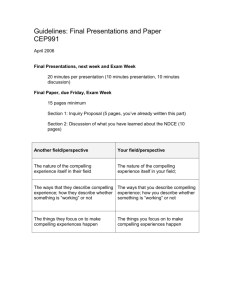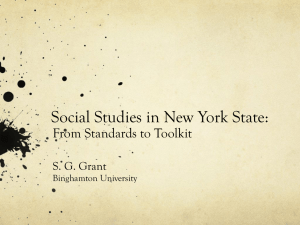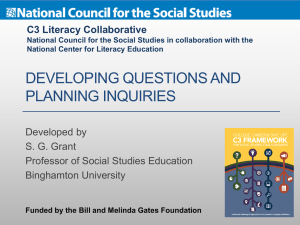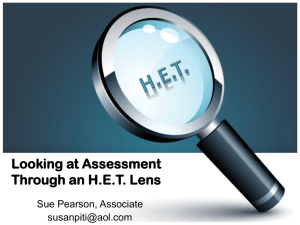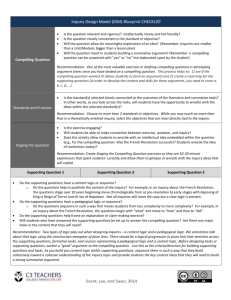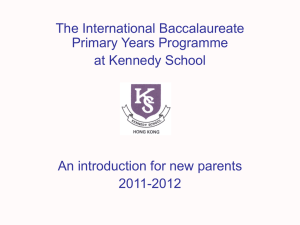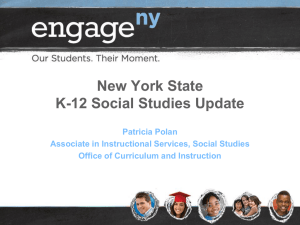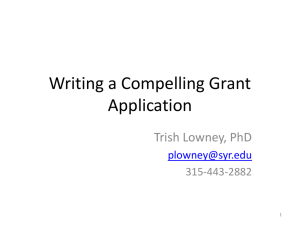PPT Presentation
advertisement
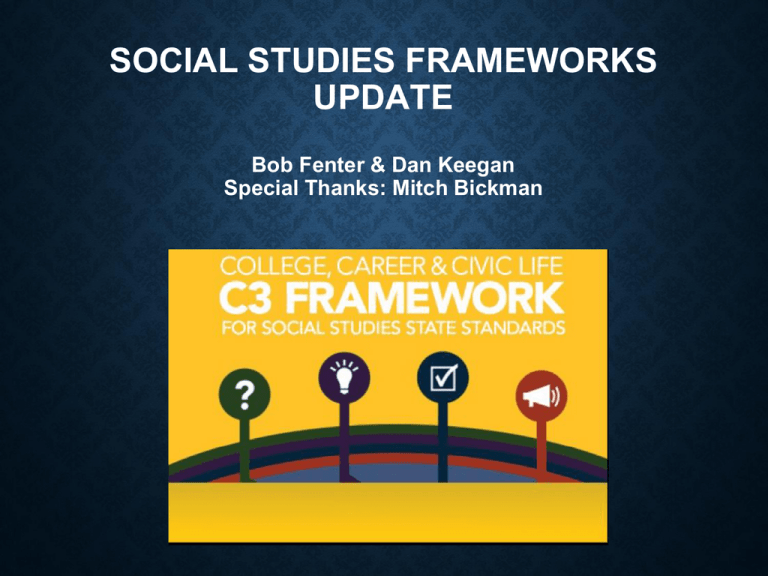
SOCIAL STUDIES FRAMEWORKS UPDATE Bob Fenter & Dan Keegan Special Thanks: Mitch Bickman GLOBAL THINKERS • Investigate the world • Are knowledge-thirsty and ask questions • Recognize problems • Communicate ideas • Collaborate • Take action INQUIRY ARC C3 - INSTRUCTIONAL SHIFTS FOR SOCIAL STUDIES Shift #1: Inquiry is at the center. Shift #2: Disciplinary integrity and interdisciplinary connections matter. Shift #3: Informed action and application of knowledge is clear and present. Shift #4: The Inquiry Arc represents an instructional arc – a frame for teaching and learning. SHIFT #1: INQUIRY IS AT THE CENTER Become actively aware of the larger world, asking significant questions about that world while wrestling with big ideas and questions for which there may not be one right answer. Focus on the use of questions to spark curiosity, guide instruction, deepen investigations, acquire rigorous content, and apply knowledge and ideas in real world settings to enable students to become active and engaged citizens in the 21st century. COMPELLING QUESTIONS Compelling questions meet two broad criteria: (1)Academically Challenging/intellectually worthwhile (2)Student friendly COMPELLING QUESTIONS Examples: (1)Are rules and laws necessary? (1) What does it mean to be an American? (1)Was the American Revolution, revolutionary? CONNECTIONS TO THE COMMON CORE STATE STANDARDS FOR ENGLISH LANGUAGE ARTS • Citing textual evidence • Understanding disciplinary vocabulary • Distinguishing and using fact, opinion, and reasoned judgment in a text • Narrating historical events. • Distinguishing competing or alternating claims RESOURCES • Binghamton University Project • Putnam-Westchester BOCES Resources • Big History • EngageNY BINGHAMTON PROJECT http://oceansideschools.org/ BIG HISTORY INTERNET RESOURCES (1) NYS Social Studies Framework https://www.engageny.org/resource/new-york-state-k-12-social-studiesframework (2) C3 Framework- http://www.socialstudies.org/system/files/c3/C3Framework-for-Social-Studies.pdf (3) Teaching Channel Presents: Social Studies Essentialshttps://www.teachingchannel.org/videos/tch-presents-social-studiesessentials The Teaching Channel has phenomenal videos in all areas. Take some time to explore this site and be inspired to try out new activities and strategies. (4) NEWSELA- https://newsela.com/ Newsela is an innovative way to build reading comprehension with nonfiction by exploring current events The Social Studies Toolkit Project ● Project Directors: ○ SG Grant - Binghamton University ○ Kathy Swan - University of Kentucky ○ John Lee - North Carolina State ● 14 writers from across New York ● 42 members of the Teacher Collaborative Council (TCC) ● 18 content and pedagogical reviewers The Task Create 14 annotated inquires and 70 abridged inquiries. This means that there will be six inquires at each grade level from K-11 and 12 at Grade 12. The Goal To marry the global vision of the C3 Framework to the content specifics of the NYS Framework in a way that honors, supports, and extends teachers’ and students’ best classroom ambitions. Descriptive/Expository What was the impact of Japanese internment during World War II? Describe three causes of the American Revolution. How did the development of farming impact early societies? Explain how the Declaration of Independence impacted the American people. Argumentative Should freedom be sacrificed in the name of national security? These questions have been used in social studies classrooms for many years. These questions Was Warin honorthe theRevolutionary content embedded really revolutionary? our discipline but are not compelling. These questions are based upon accepted views on historical issues and events. Are Was the development of these views accepted by our agriculture good for humans? students? When did Americans gain their liberty? Inquiry Topic Connection to the NY Framework key ideas and conceptual understanding Formative Tasks give students the Supporting questions build opportunity to do toward a stronger the work of understanding of the historians. compelling question. Featured Sources Formative Tasks scaffold the skills Supporting questions necessary to Supporting questions are not typically grow in interact with and to be ornamental; they must complexity throughout serve to strengthen contentdebate the the inquiry. knowledge and support the compelling Formative Tasks allow skills necessary to completequestion. students the the summative assessment. opportunity to work with primary source documents and to collect text-based evidence. Staging & Engagement We have been careful not to be prescriptive in our approach to the inquires. That is, we have not written the inquiries as a series of lessons with a beginning, middle, and end. It was our fear that too much pedagogical jargon or procedural control would limit a teacher’s ability to make the inquiry work for his/her classroom culture. We do, however, provide suggestions for staging the inquiries, and these staging suggestions are designed to help teachers “hook” students. Featured Sources are typically primary sources and very often text-rich. While a formative task will be the culmination of source analysis, teachers will be given great freedom in their pedagogical approach and use of each source. If we are to ask students to take a position and defend this position with evidence, it is imperative that we provide opposing viewpoints. Featured Sources should help students understand that issues and events of the past have relevance in modern life. That is, a typical unit’s end (World War II - 1945) does not mean that all was resolved and issues remedied. While the compelling questions driving the inquiry is worded differently, the Summative Performance Task provides more historical and content-specific focus. Teachers will be provided with a menu of task options, allowing for local decisions to be made by professionals who work with students every day. Extension activities are also written for teachers and classrooms wishing to delve deeper into the inquiry. Summative Task Timeline •Fall 2014 Publication of the Field Guide •August-October POC inquiries Refining, reviewing, piloting, and revising the •November-February inquiries Developing additional annotated and abridged •March Piloting annotated inquiries •August Publishing the Toolkit
